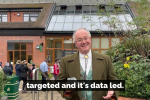Up to 150 young people across Leicester are to be trained to become lifesavers in their communities thanks to a project funded by Police and Crime Commissioner Rupert Matthews.
The Leicester, Leicestershire and Rutland PCC provided a grant worth £7,500 to national charity Street Doctors Leicester from his Safety Fund to enable the organisation to equip youngsters with the skills they need to become ‘street doctors' at the scene of a violent attack.
The funding will deliver 20 group workshops over the next 12 months for up to 150 people aged 11-25. Participants will learn what to do if someone is bleeding or has been knocked unconscious.
Delivered by young, trained healthcare volunteers including paramedics, doctors and volunteers, the workshops present young people at risk of becoming victims or perpetrators of violence with ‘peer to peer' role models who encourage peaceful intervention.
The workshops reach people through existing programmes working with young people at risk of violence including the National Citizens Service Leicester and through sports partnerships with Leicester City FC and Leicester Tigers RUFC.
The project is being showcased in a new video on the Commissioner's website as part of his commitment to keep the public updated on his work and the funding he is investing in the community to keep people safe.
Mr Matthews said: "The delivery of first aid in the crucial minutes after a violent injury saves lives. Equipping young people with the knowledge and skills to intervene in such a crisis has both a preventative and practical effect.
"I am proud to support the work of Street Doctors which has been successfully training young people to respond to trauma injuries for many years. Empowering our young people to become part of the solution to violence is a significant step on the road to safer communities where everyone takes responsibility for keeping our streets and public spaces free of violence.
"Violent crime impacts towns and cities across England and Wales and Leicester is no exception. The more we can do to protect young people and help them understand the medical and psychological consequences of violence, the more lives we will ultimately change."
The sessions, which last an hour, are being delivered in community locations such as sports camps and youth clubs for the next 12 months.
A previous workshop was hosted following a sparring session in a boxing gym, when young people were attentive and open to learning.
During each interactive session, young people learn medical basics of how the body works and its vulnerability to injury, the lifelong medical consequences of being stabbed or knocked out, how to assess the scene of an attack and safely call for emergency help and how to keep someone alive who has been stabbed or knocked out.
To view the video on the project and how the funds are being used visit: https://youtu.be/FdcDaMl2EUo

